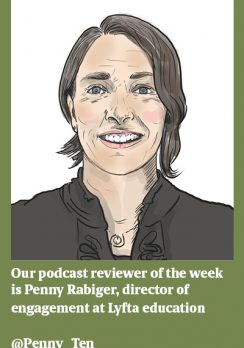To mark Black History Month, Penny Rabiger chooses five podcasts to inform your assemblies and lessons
@BBCSounds
This podcast series is compiled by the BBC World Service and features interviews with people who were actually there at key moments in Black and civil rights history. It has some incredible testimonies from great moments in Black British history to choose from, but the one I have selected is about the Bristol bus boycott, which outlines how Black British activists fought for employment rights in the 1960s. Their struggle resulted in some of the first legislation against racial discrimination in this country, and it’s inspiring to hear first-hand accounts from people such as Paul Stephenson and Roy Hackett about their part in the protest.
@noirehistoir
This is a series that features Black history facts, literature and motivational stories celebrating “Black pride, excellence and power all 366 days of the year”. You’ll hear in-depth stories about the history of important Black figures such as poet Phillis Wheatley, journalist Claudia Jones and surgeon Dr Daniel Hale Williams, along with book reviews and insight from guest speakers. The episode I have chosen is a profile of Chinua Achebe, the Nigerian novelist who has written about interactions between Africans and colonialists and who sets himself apart from more commonly heard narratives by telling the story from the perspective of Africans rather than the view of the colonisers. An important listen for anyone teaching GCSE English and modern prose.
In search of Black history with Bonnie Greer
@Bonn1eGreer
This is an Audible Original podcast so is only free to members of Audible, but it’s well worth taking up a free trial to have a listen. Bonnie Greer brings you face to face with the people in history you perhaps never knew existed and whose stories tell us a different tale about who we all are in this country. This eight-part series exposes the fascinating lives of people of African heritage and challenges the accepted wisdom of the history of Western civilisation, showing how commonly accepted historical narrative has hidden and distorted important viewpoints over centuries. I started at the beginning with episode one: Bones Do Not Lie. This episode sees Greer in conversation with history professor Olivette Otele, showing that although history is often the story of those who dominated and ‘won’, a clearer relationship with a wider range of voices from the past can uncover more of the truths about the present.
We need to talk about the British Empire
@afuahirsch
Afua Hirsch conducts six intimate conversations with a new generation of writers and historians with the direct aim of breaking through old cliches and unpicking the true legacy of our complicated and difficult inheritance. The episode I have chosen is with writer Benjamin Zephaniah, who talks from his perspective as a self-proclaimed multiculturalist and challenges the idea that we can fix what Britain will look like in the future, when it has always been a country of migrants. Zephaniah also famously turned down an OBE, explaining that this assumed honour didn’t resonate with his values and that the legacy of the empire is not one to be carried with pride in this way.
Displaying Black British history: the Krios of Sierra Leone
@HistoryWO
How might museum exhibitions convey the complex dynamics of Black British history? In the episode of the History Workshop podcast I have selected, co-curators Melissa Bennett from the Museum of London and historical researcher for The Krios Dot Com, Iyamide Thomas, discuss their work on a display at the Museum of London Docklands that tells the story of Sierra Leone’s Krio people. In the process, they have a broader conversation about Black British history in museums and the importance of community-engaged museum practice. Super-useful if you’re guiding your students through museum exhibits with a critical eye.













Your thoughts